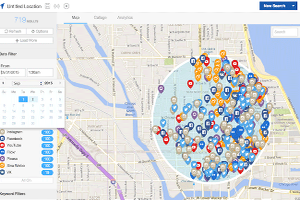Twitter sold data access to Cambridge Analytica-linked researcher
 Twitter Inc. sold data access to the Cambridge University academic who also obtained millions of Facebook Inc. users’ information that was later passed to a political consulting firm without the users’ consent.
Twitter Inc. sold data access to the Cambridge University academic who also obtained millions of Facebook Inc. users’ information that was later passed to a political consulting firm without the users’ consent.
Aleksandr Kogan, who created a personality quiz on Facebook to harvest information later used by Cambridge Analytica, established his own commercial enterprise, Global Science Research (GSR). That firm was granted access to large-scale public Twitter data, covering months of posts, for one day in 2015, according to Twitter. “In 2015, GSR did have one-time API access to a random sample of public tweets from a five-month period from December 2014 to April 2015,” Twitter said.
Read moreTwitter refuses US order to reveal user behind anti-Trump account
 Twitter filed a federal lawsuit to block an order by the US government demanding that it reveal who is behind an account opposed to President Donald Trump's tough immigration policies. Twitter cited freedom of speech as a basis for not turning over records about the account.
Twitter filed a federal lawsuit to block an order by the US government demanding that it reveal who is behind an account opposed to President Donald Trump's tough immigration policies. Twitter cited freedom of speech as a basis for not turning over records about the account.
The account is claimed to be the work of at least one federal immigration employee, according to the lawsuit filed in San Francisco federal court. The acronym US CIS refers to US Citizenship and Immigration Services, and the account describes itself as "immigration resistance." Trump has vowed to build a wall along the US border with Mexico and has promised to deport millions of illegal immigrants.
Read moreEU authorities demand changes from Facebook, Google, Twitter
 Social media companies Facebook Inc, Alphabet Inc and Twitter Inc will have to amend their terms of service for European users within a month or face the risk of fines, a European Commission official said on Friday. U.S. technology companies have faced tight scrutiny in Europe for the way they do business, from privacy to how quickly they remove illegal or threatening content.
Social media companies Facebook Inc, Alphabet Inc and Twitter Inc will have to amend their terms of service for European users within a month or face the risk of fines, a European Commission official said on Friday. U.S. technology companies have faced tight scrutiny in Europe for the way they do business, from privacy to how quickly they remove illegal or threatening content.
The Commission and European consumer protection authorities will "take action to make sure social media companies comply with EU consumer rules," the official said. Germany, the most populous EU state, said this week it planned a new law calling for social networks such as Facebook to remove slanderous or threatening online postings quickly or face fines of up to 50 million euros ($53 million).
Read moreThe NSA's 'Twitter for spies' has over 60,000 users
 Data obtained through a Freedom of Information Act request reveals just how popular the NSA's social network for spies called eChirp really is.
Data obtained through a Freedom of Information Act request reveals just how popular the NSA's social network for spies called eChirp really is.
Last week, the secret-spilling website WikiLeaks made headlines once more for publishing a large cache of alleged secret files about the CIA's hacking operations. Those files apparently came from a little-known service for the US intelligence community known as Intellipedia. Many probably still don't know of the "Wikipedia for spies." And many probably don't know that there's also a Twitter for spies, called eChirp. The service is widely used among American spies.
Read moreFacebook, Twitter and Instagram share data with social media surveillance startup
 Facebook, Instagram, Twitter, VK, Google's Picasa and Youtube were handing over user data access to a Chicago-based Startup which then sold this data to law enforcement agencies for surveillance purposes.
Facebook, Instagram, Twitter, VK, Google's Picasa and Youtube were handing over user data access to a Chicago-based Startup which then sold this data to law enforcement agencies for surveillance purposes.
Government records obtained by the American Civil Liberties Union revealed that the big technology corporations gave "special access" to Geofeedia. Geofeedia is a controversial social media monitoring tool that pulls social media feeds via APIs and other means of access and then makes it searchable and accessible to its clients, who can search by location or keyword to quickly find recently posted and publicly available contents.
Read moreFirst Twitter-controlled Android botnet acts as backdoor to download malware
 Security researchers have uncovered the first ever Twitter-controlled Android botnet, which acts as a backdoor to download malware onto infected devices. Dubbed Twitoor, the malicious app is not available on any official Android app stores.
Security researchers have uncovered the first ever Twitter-controlled Android botnet, which acts as a backdoor to download malware onto infected devices. Dubbed Twitoor, the malicious app is not available on any official Android app stores.
Researchers believe that the botnet is possibly distributed via SMS or malicious URLs. The botnet is stealthy and capable of hiding its existence on infected devices. The botnet also masquerades as a porn player app or MMS app but does not come equipped with the functionalities of either. Twitoor has been active for a month and has been downloading several variants of mobile banking malware.
Read moreNiantic CEO John Hanke's Twitter account hacked
 The latest victim in a long line of high-profile twitter attacks is the CEO of Pokemon Go developer Niantic, John Hanke. A series of Tweets was posted to Hanke's 16,000 followers. They were hashtagged "OurMine" and claimed the hack was for Brazil, where Pokemon Go has yet to be released.
The latest victim in a long line of high-profile twitter attacks is the CEO of Pokemon Go developer Niantic, John Hanke. A series of Tweets was posted to Hanke's 16,000 followers. They were hashtagged "OurMine" and claimed the hack was for Brazil, where Pokemon Go has yet to be released.
One tweet also claimed that Hanke's password was "nopass," but the Quora links to the hacker's explanations have been removed. Interestingly, OurMine is a company that claims to assess social network account security, so the hack seems like a marketing stunt, directing users to upgrade account security.
Read moreTwitter CEO Jack Dorsey's account hacked
 The Twitter chief executive, Jack Dorsey, had his Twitter and Vine accounts hacked. The hacking group which posted on Dorsey’s account, OurMine Security, is the same group which has previously defaced social media accounts belonging to Facebook CEO Mark Zuckerberg and Google boss Sundar Pichai.
The Twitter chief executive, Jack Dorsey, had his Twitter and Vine accounts hacked. The hacking group which posted on Dorsey’s account, OurMine Security, is the same group which has previously defaced social media accounts belonging to Facebook CEO Mark Zuckerberg and Google boss Sundar Pichai.
This time, OurMine released a few Vine videos through Dorsey’s account, which cross-posted to his Twitter feed. The publicity-hungry hackers posted their standard message – that they were “testing your security” – along with the last video they posted. As with every previous hack carried out by OurMine, Twitter itself was not the source of the compromise.
Read moreMore than 32 million of Twitter accounts leaked
 Everyone likes Twitter. Well, okay, maybe not everyone, but at least 310 million users visit the micro-blogging platform monthly. And now these 310 million have to consider changing their Twitter password. This is not because they are as insecure.
Everyone likes Twitter. Well, okay, maybe not everyone, but at least 310 million users visit the micro-blogging platform monthly. And now these 310 million have to consider changing their Twitter password. This is not because they are as insecure.
‘Astrologers proclaimed a month of leaks. The population of leaks doubled.’ If you know what I mean. The announcement about 117 million LinkedIn accounts was shortly followed by the leakage of several hundred million MySpace and Tumblr accounts, then by 100 million VK.com accounts. Now the hacker claims to have 379 million Twitter accounts.
Read moreSpambots have taken over at least 2,500 Twitter accounts
 In the span of two weeks, hackers have broken into more than 2,500 Twitter accounts with large followings, including those of electro-funk duo Chromeo, comedian Azeem Banatwala, football star Cecil Shorts III, and late New York Times journalist.
In the span of two weeks, hackers have broken into more than 2,500 Twitter accounts with large followings, including those of electro-funk duo Chromeo, comedian Azeem Banatwala, football star Cecil Shorts III, and late New York Times journalist.
The hacked accounts were then replaced with bots, and used to tweet links to adult dating sites. The victims had their display names changed, with their profile pictures swapped for pictures of scantily-clad women. While bots are nothing new on Twitter, a platform that’s been plagued with fake accounts for years, this campaign is different because it uses almost exclusively real accounts that got hacked.
Read moreAxarhöfði 14,
110 Reykjavik, Iceland















